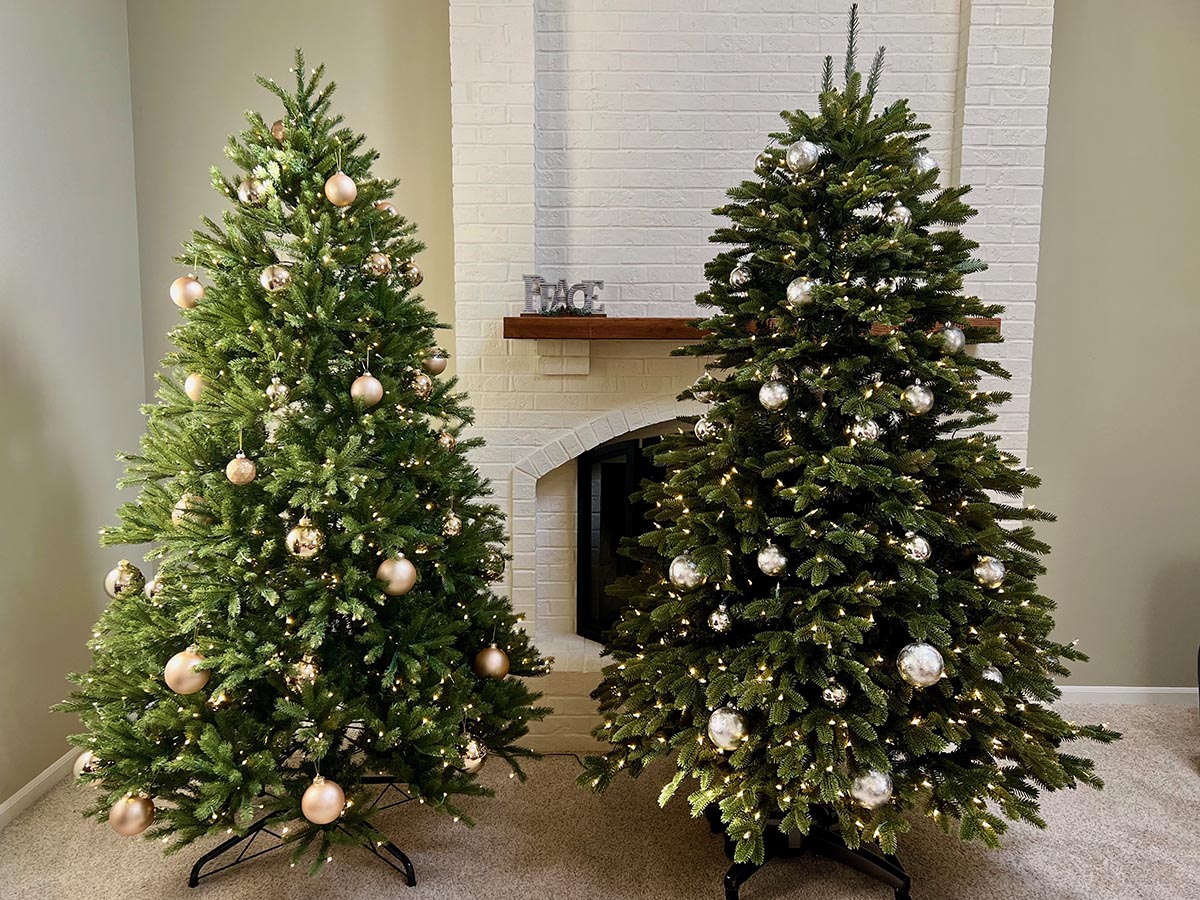
We may earn revenue from the products available on this page and participate in affiliate programs. Learn More ›
It’s easy to get overwhelmed choosing a Christmas tree for the holidays. Among an abundant number of tree species, heights, and light options, the choices can seem endless. Balsam Hill and King of Christmas aim to make the choice a little bit easier by offering an often superior level of realism in their trees as well as including accessories that elevate your experience with their products.
Of course, higher-end products like these come with higher price tags, so you want to be sure to choose carefully. Over the years I’ve tested eight artificial Christmas trees from five brands, and these two brands are exceptional. I tested each brand’s Fraser firs for several weeks, and here’s my take on these specific trees, and the brands overall.
Balsam Hill and King of Christmas: At a Glance
Our ratings:
Balsam Hill Fraser Fir Flip Tree: 4.4/5
King of Christmas Fraser Fir: 4.6/5
| Balsam Hill Fraser Fir | King of Christmas Fraser Fir | |
| Available heights | 5.5., 6.5, 7.5, 9, 10, 12 | 5.5., 6.5, 7.5, 9, 10, 12 |
| Number of branch tips for 7.5 feet | 3,424 | 3,022 |
| Number of lights for 7.5 feet | 540 to 1320 candlelights depending on lighting and setup options | 1,000 microlights |
| Lighting options | Unlit, Incandescent Clear, LED Clear, LED Multicolor, LED Multicolor and Clear, Twinkly Light Show | Unlit, LED Clear and Multicolor |
| Warranty | 3-year | 2-year |
| Included accessories | Storage bag, shaping gloves, remote control for lights | Storage bag, shaping gloves, remote control for lights |
Testing the Balsam Hill and King of Christmas Trees
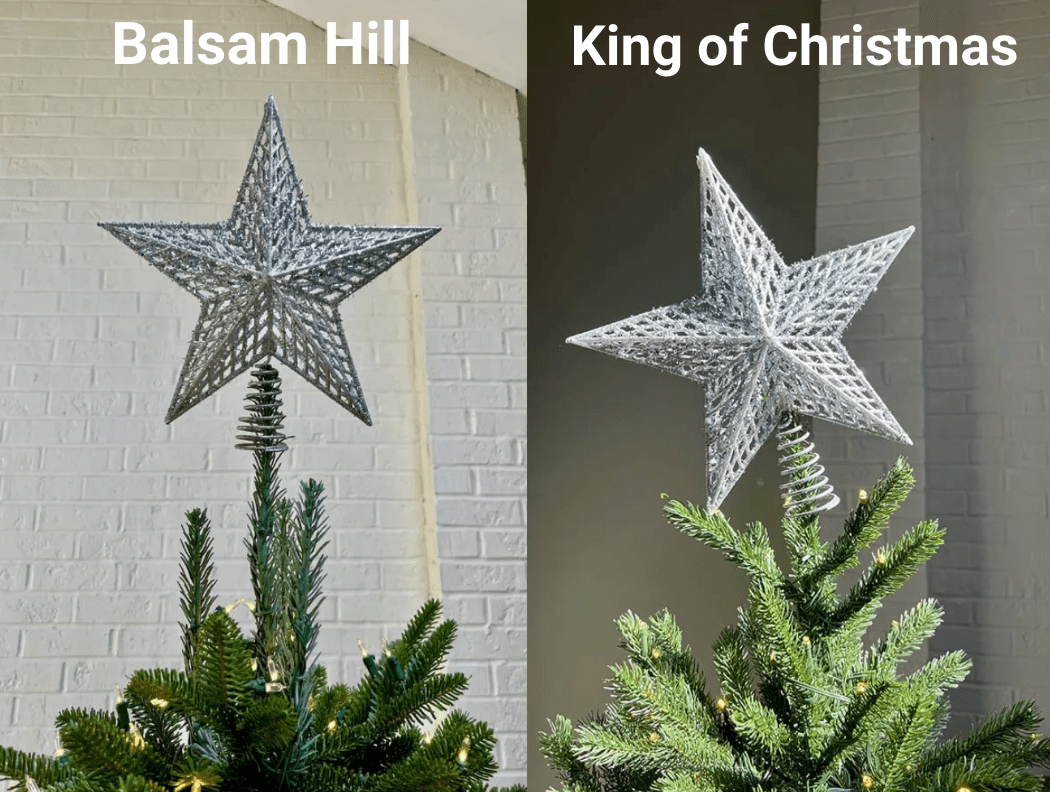
I tested each of these trees in my home and left them up for several weeks so that I could consider both my initial and longer-term impressions of each tree. I rated the trees on setup, realism, stability, lighting, disassembly and storage, as well as the overall value of the trees.
Upon receiving each tree, I set them up as I would my own Christmas trees, sorting and fluffing branches as needed, and then decorated them—but not too much. I didn’t want an abundance of decoration to sway my opinions of the trees themselves. I took note of how long the setup took and how easy the trees were to shape. I then tested each tree for stability in three ways: 1) hanging heavy ornaments; 2) placing a tree topper; and 3) bumping into the tree numerous times.
Over several weeks, I assessed the appearance of each tree, the quality and realism, and the lights. Finally, I took down the trees, again noting the length of time it took and how easy it was to do.
| Balsam Hill Fraser Fir | |
|---|---|
| What We Like | What We Don’t Like |
| Proprietary flip technology makes for a super-quick setup | Very heavy at 74 pounds |
| Wheeled base makes it easy to move from room to room | Outer branches sag with weighty ornaments |
| Beautifully realistic detail Includes several helpful accessories Extra-strong top branches 900 lights plus remote and foot pedal | Very expensive |
| King of Christmas Fraser Fir | |
|---|---|
| What We Like | What We Don’t Like |
| 8 light settings and 3 brightness settings | Top branches are not as sturdy as the rest |
| Realistic-looking needles and shapeStrong branches easily hold heavy ornaments Includes several helpful accessories 1,000 lights plus remote and foot pedal | Strong branches are hard to compress for storage |
The Balsam Hill Fraser Fir setup is easier and faster.
To be fair, no tree in our Best Artificial Trees buyer’s guide is easier or faster to set up than the Balsam Hill Flip Tree. The Flip Tree is specially designed for easy transport and rapid setup. The base branches flip upside down so that they naturally compress for storage into the included canvas bag. When they’re flipped right side up, they fall back into place. It takes a fraction of the time to set up compared to other trees.
Of course, this isn’t exactly a fair comparison because the King of Christmas tree does not have a quick-flip technology to compare to Balsam Hill. However, I’ve tested another Balsam Hill tree, the Classic Blue Spruce, and I would say that that tree is also easier to set up than the King of Christmas Fraser Fir. The Blue Spruce’s branches were sturdy yet flexible, making them easy to adjust. The King of Christmas tree’s branches are sturdy—which bodes well for longevity—but they were much stiffer to shape. That said, I still would not call that a dealbreaker; it just takes some extra time to set up the tree.
The King of Christmas Fraser Fir holds heavy ornaments better.
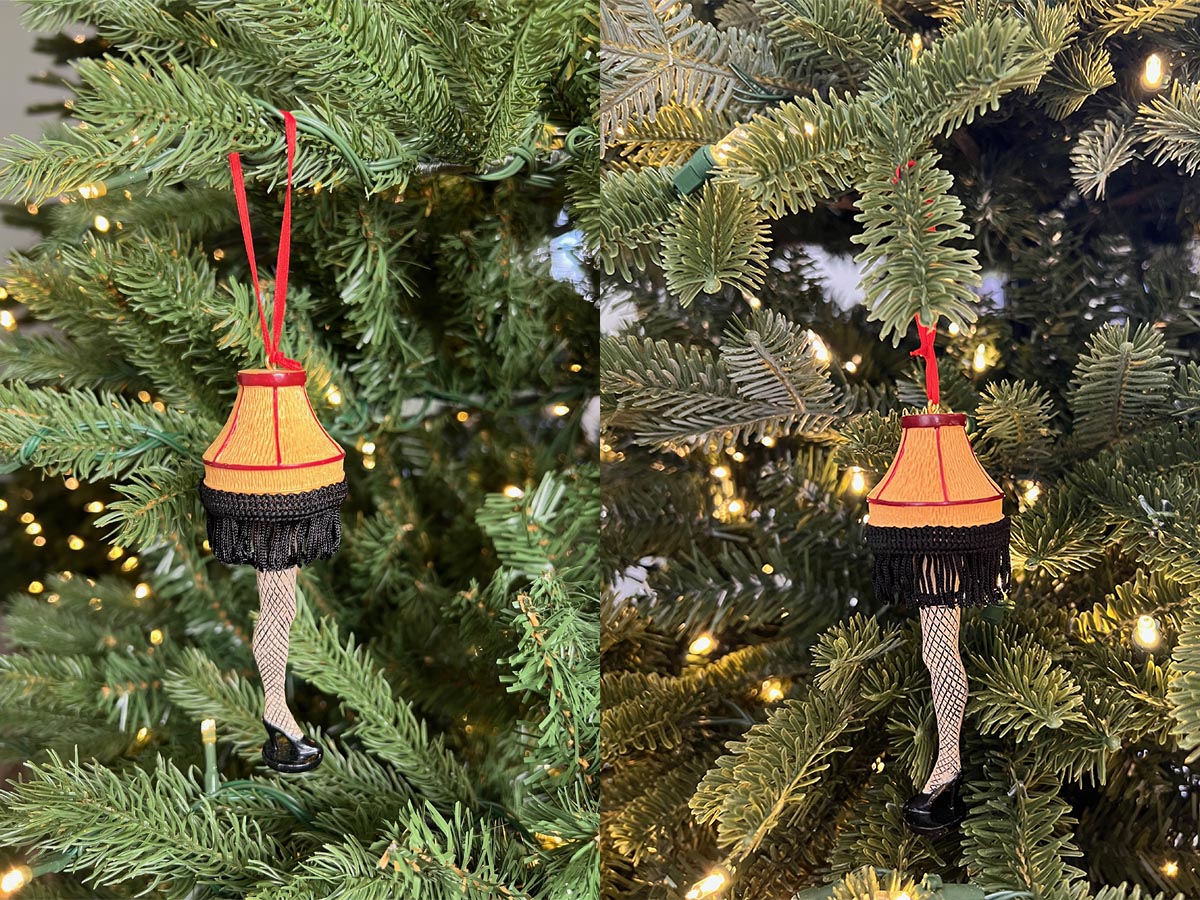
Given how stiff the branches were to move when setting up the King of Christmas, it’s no surprise that they held heavy ornaments remarkably well. For reference, shatterproof ball ornaments weigh about .5 ounces. Both trees, of course, held those just fine. When I placed ornaments 5 times that weight, the King of Christmas branches barely budged.
While the Balsam Hill could hold heavier ornaments, I had to place them deeper on a branch or on the bottom branches. I should also note that Balsam Hill’s Blue Spruce supports heavy ornaments just fine, so this could be due to Fraser Fir’s design, not brand design. The Balsam Hill, however, excelled at holding a tree topper thanks to its three, extra-stiff branches at the top for just this purpose.
They both have beautiful lighting, but King of Christmas is brighter.
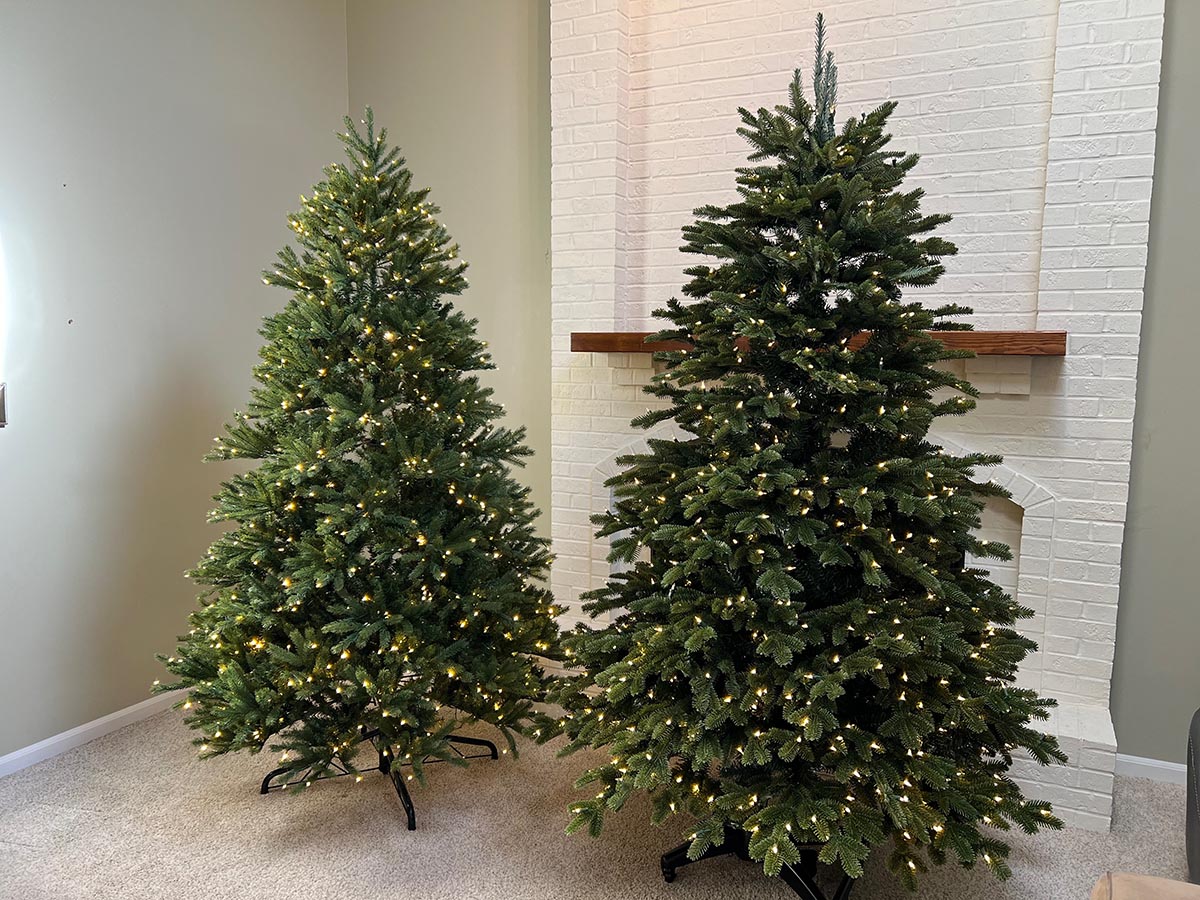
At the very least, a Christmas tree should have 100 lights per 1 foot of tree. With the exception of the Twinkly Light Show option on the Balsam Hill, both of these prelit Fraser firs well exceed that standard and cast a festive glow. They’re also well placed, swirling from branch tips to the inner tree limbs, so the entire tree is illuminated. The lighting for both trees connects through the trunk, making setup easier. I appreciate not having to search for the ends of lighting cords. Both trees include remote controls and foot pedals for extra-easy light control.
The Balsam Hill that I tested has clear LED candlelight bulbs, while the King of Christmas tree has both clear and multicolor options, so I can’t compare Balsam Hill’s multicolor lights, even though their trees do have that option. When both trees’ lighting settings are on clear (white), however, the King of Christmas tree is a bit brighter.
The King of Christmas tree, however, has eight lighting options: steady clear, steady multicolor blinking clear, blinking multicolor, fading clear, fading multicolor, blinking between clear and multicolor, and fading between clear and multicolor. It also has three brightness settings. All of these settings can be accessed on the foot pedal or the remote; however, I had to point the remote directly at the foot pedal for it to work. On the other hand, I could operate the Balsam Hill remote no matter where I pointed it.
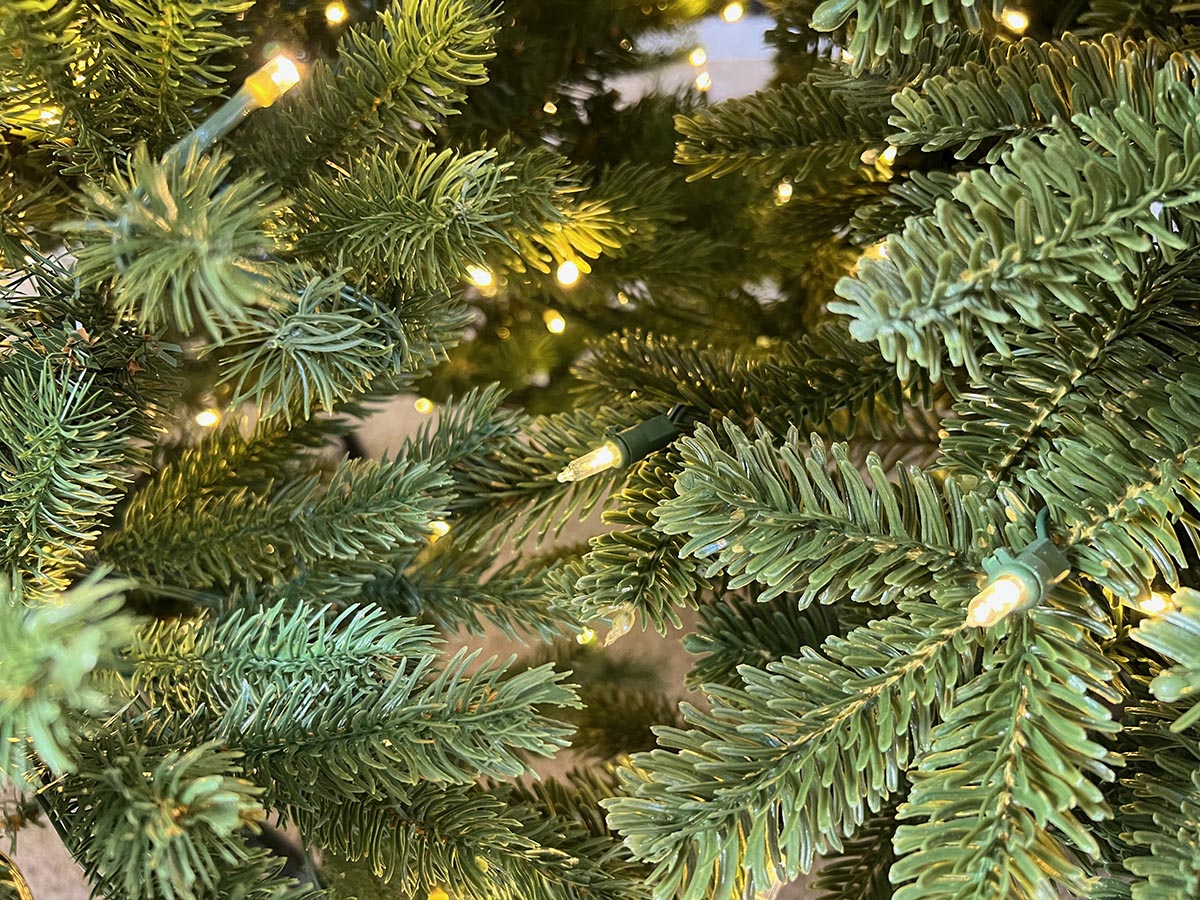
They are both realistic-looking.
These trees are made by premium brands and it shows, albeit in different ways. Both trees have lifelike needles on their branch tips, with flat needles on the inner limbs. Balsam Hill’s needles are broader and shorter. The underside of the needles, much like real Fraser firs, is lighter, almost silvery. The branch tips are a light brown, again mimicking Mother Nature. The broader design does give the needles a bit of a molded appearance, which not all may appreciate.
In contrast, the needles on the King of Christmas are much narrower and more like a sewing needle. They fill the entire circumference of the branch tips, giving the tree a full appearance. They don’t have the lighter underside that the Balsam Hill does, nor the light brown branch. Still, the fine needles give the King of Christmas an exceptionally realistic appearance.
The overall shape of both trees also reflects a more organic aesthetic, unlike highly symmetrical artificial trees of the past.
They both have storage challenges.
While appearance and stability probably top the list of shopping considerations, being able to easily take a tree down and store it conveniently should also be on your mind. After all, getting ready for the holidays takes a lot of time, cleaning up after them shouldn’t.
As I mentioned before, the King of Christmas tree has wonderfully sturdy branches. The downside of that is shaping them, both for display and to put away. It includes a storage bag, which is great, but I really had to muscle the tree in to get it to fit. Once it was in, there was absolutely no way I could have used the small handle to carry it to my basement storage room. I would have preferred a sturdier bag or a box.
Taking down the Balsam Hill was just as easy to take down as it was to set up, thanks to its flip function. It also comes with two sturdy canvas storage bags: one for the base and one for the top. I had no trouble getting either piece in the bag, and storing it would be a breeze—if I didn’t have to store it in my basement. Because the base is wheeled, I have to put it back in its shipping box to carry downstairs. It’s a hearty, two-person job to carry it up and down stairs, to say the least. My advice? Store the flip tree on the same floor where it will be displayed.
OK, but are they splurge-worthy?
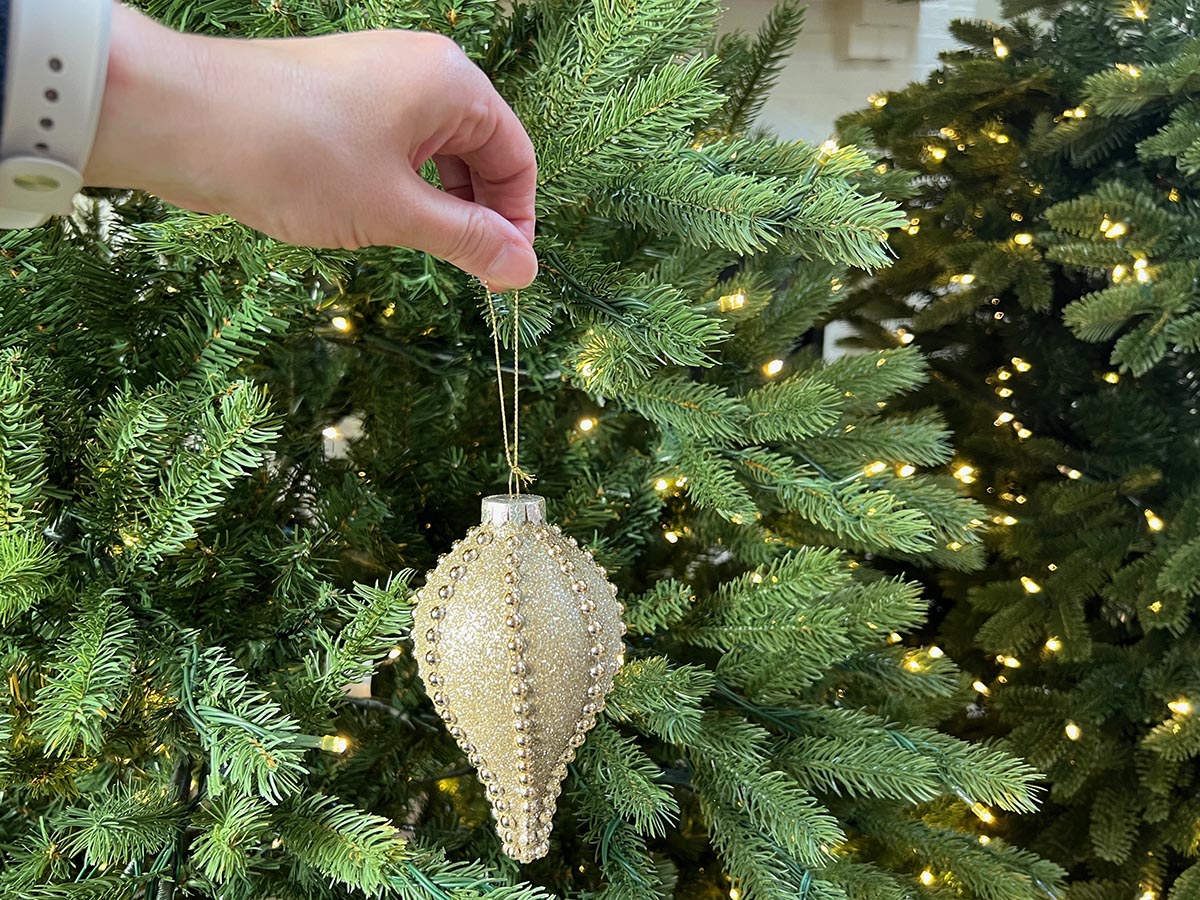
There’s no doubt about it. Both of these trees are spendy, and that affected their overall ratings listed above. The 7.5-foot King of Christmas Fraser fir with clear and multicolor lights is $1,199 full price. For an equal comparison, the 7.5-foot Balsam Hill Fraser fir flip tree with clear and multicolor lights is $1,999; without the flip function, it’s $1,499.
Fortunately, you can find these trees on sale throughout the year. As of this publication, the King of Christmas Fraser fir is on sale for $999. The Balsam Hill Fraser fir flip tree is on sale for 1,699 and the standard setup Fraser fir is on sale for $1,099
Whether you’re willing to spend that much depends on how much you value Christmas decorations. I’ve used and tested trees from other brands, and while many are nice-looking, they aren’t always as realistic-looking, often shed a lot more needles, and don’t have as many branch tips as these brands. These brands are great options for your main Christmas tree, but I would wait for the sale prices before buying.
Product Comparisons
| Balsam Hill Fraser Fir Flip Tree See our review. | King of Christmas Fraser Fir | Balsam Hill Prelit Classic Blue Spruce | Puleo International Prelit Aspen Fir | National Tree Company Full Downswept Douglas Fir | |
| Available Heights | 6.5, 7.5, 9, 10 feet | 6.5, 7.5, 9, 10, 12 feet | 4.5, 5.5, 6.5, 7, 7.5, 9, 10, 12 or 15 feet | 4.5, 6.5, or 7.5 feet | 4, 6.5, 7, 7.5, 9, 10, or 12 feet |
| Number of Branch Tips for 7.5 feet | 3,424 | 3,022 | 2,960 | 1,319 | 1,883 |
| Warranty | 3-year | 2-year | 3-year | 5-year | 3-year |
So, is Balsam Hill or King of Christmas right for you?
Truly, these are both great brands. Balsam Hill offers more tree options, but King of Christmas is more affordable. If you put a premium on your time, the Balsam Hill flip tree is an amazing option. I tested the Fraser fir, but it also comes in several other species of trees, and for less than $30, Balsam Hill offers a tree branch sample kit. Without the flip option, the Balsam Hill trees become much more on par with the King of Christmas price-wise.
However, if you want to spend a little less, but still have a realistic, durable, beautiful tree, I’d say it’s hard to go wrong with the King of Christmas Fraser fir.
Meet the Tester
As an editor at BobVila.com, Beth Cranston designs the testing guidelines for the product reviews team, having developed parameters for more than 300 product categories. While her collection of Christmas decor isn’t vast, she loves what she has and wants readers to find products that they’ll love too.
